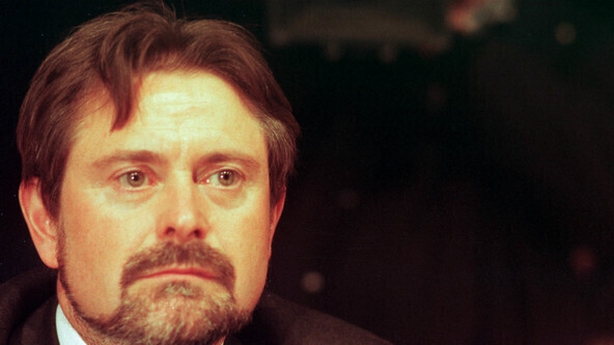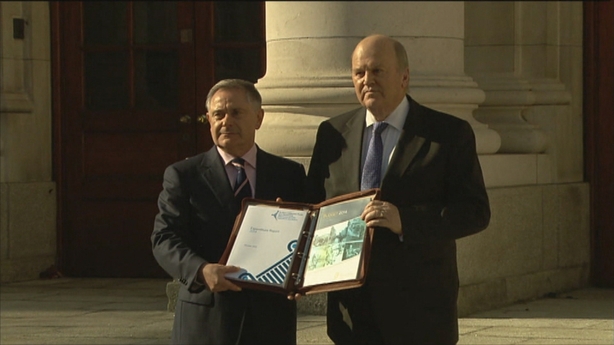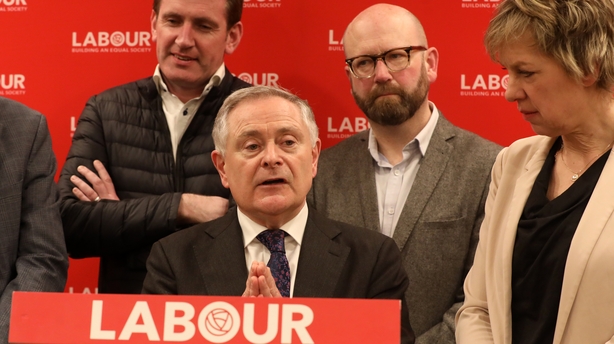Former Labour Party leader Brendan Howlin has said that the difficult spending cuts initiated by the Government in which he was minister for public expenditure paved the way for the successful economy the country has today.
Mr Howlin has announced that he will not be seeking re-election as a TD in the next general election - a move that will end a career in the Dáil stretching back to 1987. Prior to then, he was a senator for almost five years.
"After 40 years in the Oireachtas and having reached the normal retirement age it was something that's certainly on the agenda," he told RTÉ News today.
"I’m very proud of my four decades in public life; three times serving as a cabinet minister; serving as leader and deputy leader of the party I love; and I suppose most of all enjoying the unbroken support of the people of this great county of Wexford but I think it’s time now for me to pass on the baton and for somebody else to continue the great Labour tradition here."

Named after Brendan Corish, who was Labour leader when Brendan Howlin was born in 1956, the Wexford TD is from a family steeped in trade union and Labour traditions. After being involved in the anti-nuclear movement in the late 1970s, he ran for election for the first time in the November 1982 general election.
"I was lucky in that we had three general elections in a row in the early '80s. Brendan [Corish] decided to retire after the first one of those and his brother stood in the second and I was asked [to stand in the third]," he said.
"The first election I ever contested was for the Dáil. I was nominated after that election to the Senate and in the 1987 election to the Dáil and I've been elected at every general election since, either coming first or second in every election since 1989."
His first cabinet position was in health, during the post-1992 Fianna Fáil-Labour coalition.
"People will laugh now when they think about it but one of the first pieces of legislation I ever introduced was a very simple bill to deregulate access to condoms. We inaugurated the first Aids campaign which was a very positive campaign of protection using condoms, and we initiated the very first National Health Strategy during my time in health."
We need your consent to load this rte-player contentWe use rte-player to manage extra content that can set cookies on your device and collect data about your activity. Please review their details and accept them to load the content.Manage Preferences
Then followed a period as minister for environment, before a period in opposition during which he twice ran unsuccessfully for the Labour Party leadership - losing to Ruairí Quinn and Pat Rabbitte.
Following the post-economic crash election of 2011, he was Minister for Public Expenditure and Reform in a Fine Gael-Labour coalition, and during a time of austerity cuts.
"We went into Government in 2011, we had a fiscal crisis, the State literally had no money and was beholden to the troika; we had an employment crisis where 200,000 people were made unemployed because of the collapse of the construction industry; and we had a banking crisis, we didn’t have a functioning banking system which was essential to the economy.
"What we achieved in bringing a country literally on the edge of complete ruin, where we may never have recovered, to a functioning economy again, 200,000 people back in work in those five years, and a functioning banking system. If we hadn’t had that success, what came subsequently with, for example, Covid, the State being in a position to support workers wouldn’t have been possible without a functioning, successful economy, and the difficulty of those five years for the people of Ireland.

"I don’t underestimate for a second they were traumatic and difficult for so many people, but the process of correcting the disasters that were visited upon the State by bad policies in the previous administrations, we were able to correct."
It was put to him that some Labour Party members and supporters believe the party has never recovered, electorally, from that period.
"I think that’s true," he replied.
"Some people are blaming the people who were charged with fixing the problem rather than those who actually created the problem in the first instance"
"I think people, you know, people understand that if you’re terribly ill you understand there’s a treatment that you might have to go through in hospital to get better, but you don’t appreciate it and you don’t appreciate those who are doing it to you and it was very, very painful for a lot of people and I don’t want to diminish that one iota.
"It was a very painful and challenging time and the decisions we made during that time were always the least worst in terms of their impact on people. And I do know that, had Labour decided not to go into Government that the strategy Fine Gael had laid out, for example, was to fix the economy on a 3:1 ratio of cuts to public expenditure and taxation. We insisted on a 50:50 basis, so the cuts to public spending would have been even more severe without our input.
"But I understand people who are hurt want to blame people for that, but some people are blaming the people who were charged with fixing the problem rather than those who actually created the problem in the first instance."
Despite Labour currently holding just seven Dáil seats, he believes the party has a future.
"I think there is an understanding of the role that Labour has always played, particularly in the social evolution and economic evolution of this country. Every major social change, and Ireland is a different country, a completely different country than it was when I entered politics.

"We now have people coming to Ireland, we now have a successful economy, we’ve huge problems to address, that is the truth and unfortunately they haven’t been addressed by the present administration, with plenty of resources, and that is the housing crisis number one. That is fixable.
"We’ve overcome enormous challenges, as I’ve described, in the past and there seems to be just an inability in the current administration to fix the housing crisis which is causing such social devastation across the State.
"We have to carry on the agenda of building real equality because we still have a great divergence between income levels in our economy, and we can eliminate child poverty, certainly. It’s an ambition but it’s an achievable ambition for a rich country.
"Although we’ve made an incredible evolution for the better, from the ‘80s to now, we still have a way to go and I think people appreciate that the Labour Party which has been at the vanguard of progress in everything over those 40 years and longer will continue to have a role, I believe."
Asked if he believes Labour should be part of a Sinn Féin-led coalition after the next election, he said: "Well let’s see what happens. The view I’ve always taken is that unless you have critical mass, unless you can define a policy agenda of a government you’ve no part to play in it. We won’t be there in any shape or form to make up the numbers. With whoever we deal with after the election it will be on the basis of having critical mass to shape a Government policy and a Government agenda."
On such a decision, he added: "It won’t be for me. I’m on the way out, if you like. I won’t be a TD after the next election and it will be for Ivana Bacik and it will be for the parliamentary Labour Party and the broad membership of the party to make those decisions."
As for his own future, post-election: "I’m going to be working very hard to ensure there’s continuity in this [Wexford] constituency, for a start. The Labour seat that we‘ve held from the foundation of the State has to be won again, I’m very confident it will be won and after that I don’t know.
"I don’t know what opportunities or challenges or suggestions might be made to me. I haven’t any plans."






